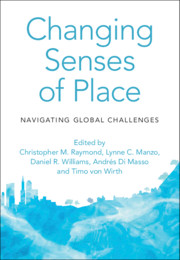Book contents
- Changing Senses of Place
- Changing Senses of Place
- Copyright page
- Dedication
- Contents
- Contributors
- Foreword
- Preface
- Acknowledgements
- Introduction
- Part I Climate Change and Ecological Regime Shifts
- Part II Migration, Mobility and Belonging
- Part III Renewable Energy Transitions
- Part IV Nationalism and Competing Territorial Claims
- Part V Urban Change
- Part VI Technological and Legal Transformations
- 19 Electronically Mediated Sense of Place
- 20 A Dynamic View of Local Knowledge and Epistemic Bonds to Place
- 21 Social Media and Experiences of Nature
- Part VII Design and Planning Strategies for Changing Senses of Place
- Part VIII Conclusion
- Index
- References
19 - Electronically Mediated Sense of Place
from Part VI - Technological and Legal Transformations
Published online by Cambridge University Press: 15 July 2021
- Changing Senses of Place
- Changing Senses of Place
- Copyright page
- Dedication
- Contents
- Contributors
- Foreword
- Preface
- Acknowledgements
- Introduction
- Part I Climate Change and Ecological Regime Shifts
- Part II Migration, Mobility and Belonging
- Part III Renewable Energy Transitions
- Part IV Nationalism and Competing Territorial Claims
- Part V Urban Change
- Part VI Technological and Legal Transformations
- 19 Electronically Mediated Sense of Place
- 20 A Dynamic View of Local Knowledge and Epistemic Bonds to Place
- 21 Social Media and Experiences of Nature
- Part VII Design and Planning Strategies for Changing Senses of Place
- Part VIII Conclusion
- Index
- References
Summary
This chapter is an examination of the various ways senses of place have been changed by the development of electronic media since the invention of the telegraph, with particular attention to developments since the invention of the World Wide Web in 1990. Impacts of electronic communications on five aspects of sense of place are considered. Neurological and ontological aspects are largely immune, but individual, social and public aspects are affected in ways that have been variously interpreted as diminishing sense of place by distracting us from our surroundings, or alternatively as enhancing it with rich data about places and increased global awareness. However, as electronic media have become increasingly pervasive, concerns have been raised about their role as agents of corporate power and their role in surveillance of places.
- Type
- Chapter
- Information
- Changing Senses of PlaceNavigating Global Challenges, pp. 247 - 258Publisher: Cambridge University PressPrint publication year: 2021

